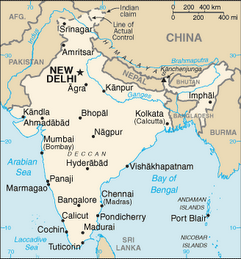 As is inevitable in India, one will encounter a set of arbitrary 'rules' for which no logic is sufficient for understanding. Pretenses are a favorite on the sub-continent, and enforcement and actual sense are less common. For example, each day I walk through a rectangle of two-by-fours which rifles off a loud beep to a man standing nearby who never looks up from his newspaper. Why then have the 'metal detector' if the goal and end of its positioning is not enhanced safety? Employment, I suppose.
As is inevitable in India, one will encounter a set of arbitrary 'rules' for which no logic is sufficient for understanding. Pretenses are a favorite on the sub-continent, and enforcement and actual sense are less common. For example, each day I walk through a rectangle of two-by-fours which rifles off a loud beep to a man standing nearby who never looks up from his newspaper. Why then have the 'metal detector' if the goal and end of its positioning is not enhanced safety? Employment, I suppose.The same illogical application of rules worms its way into diurnal activities. Today, as I attempted to enter PVR cinemas, a venue which prides itself on its 'bringing smiles' advertising campaign, I nearly thrust my fist through its colorful facade. After passing through a set of two-by-fours, being frisked by three separate men, and emptying the contents of my small backpack, my chewing gum box was confiscated and I was told I could not enter with my bag. Understanding the stupidity of nearly all Indian rules, and the flexibility with which they are typically enforced, I asked in a number of increasingly simplistic ways if I could both keep my gum and enter with my bag. Now, I understand the logic of no chewing gum in a theater, but why confiscate a stale pack at the bottom of my bag when the teenage girls around me chomp away on Trident? Wouldn't it make more sense to employ a dental agent at the door aside the two-by-fours prying gum from under each person's tongue? Ok, well perhaps it's no better. But to the second point, that bags are not allowed in the theater, my counter-argument was obvious: we're in a shopping mall.
 Unyielding to even my most simplistic and sycophantic requests, I erupted into a slur of expletives, and leaned into the man's hollow face, shouting at him and excoriating his lemming-like dearth of purpose. I eventually gained entrance to the theater and watched a dreadfully bad movie that, as its highlight, featured Bipasha Basu dancing. Arbitrary rules, lack of context, and idiocy with which they are invariably enforced is painstaking across India, and affirms my desire to land on Finnish soil in three weeks. I hope that as I board my FinnAir flight, the tranquility promised bears more veracity than PVR's successfully well-orchestrated 'Bringing Smiles' campaign.
Unyielding to even my most simplistic and sycophantic requests, I erupted into a slur of expletives, and leaned into the man's hollow face, shouting at him and excoriating his lemming-like dearth of purpose. I eventually gained entrance to the theater and watched a dreadfully bad movie that, as its highlight, featured Bipasha Basu dancing. Arbitrary rules, lack of context, and idiocy with which they are invariably enforced is painstaking across India, and affirms my desire to land on Finnish soil in three weeks. I hope that as I board my FinnAir flight, the tranquility promised bears more veracity than PVR's successfully well-orchestrated 'Bringing Smiles' campaign.

















